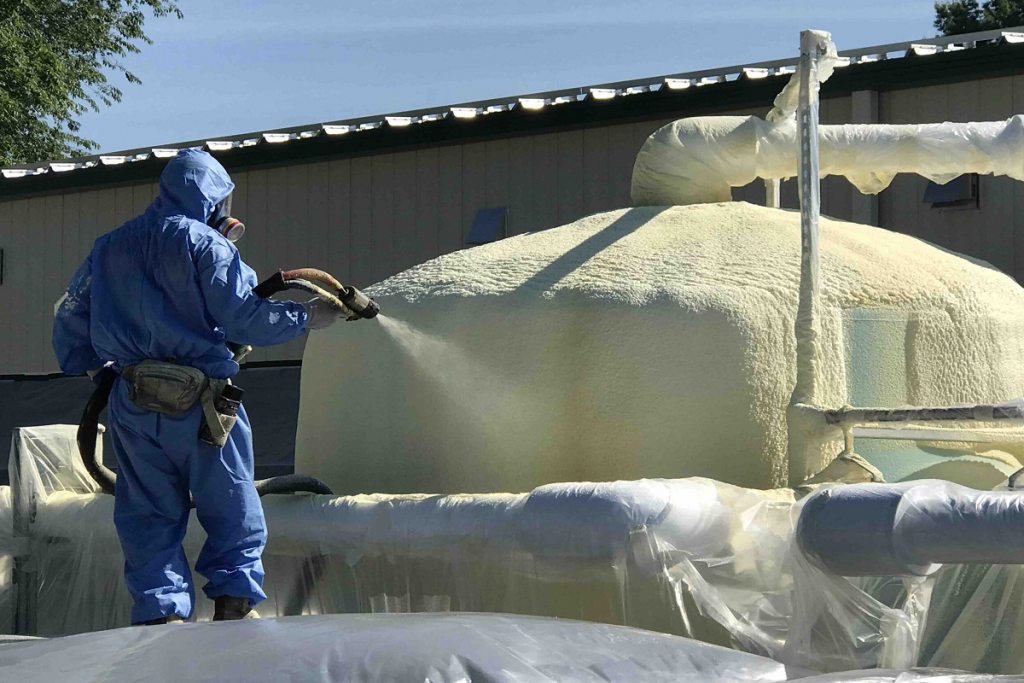
How Spray Foam Insulation Can Help You Achieve Your Home Improvement Goals
August 17, 2023
Spray Foam Insulation for New Home Construction: Project Planning and Execution
August 30, 2023Industrial buildings are the backbone of various operations, from manufacturing to warehousing. One crucial aspect that often goes unnoticed is insulation. Upgrading insulation in your industrial facility can yield numerous benefits, ranging from energy efficiency to improved working conditions. Explore the advantages and essential considerations when upgrading insulation in your industrial building.
Increased Energy Efficiency
Efficient insulation minimizes heat transfer, resulting in lower energy consumption and reduced utility costs.
– Temperature regulation: Improved insulation helps maintain consistent indoor temperatures, reducing the need for excessive heating or cooling.
– Energy savings: Proper insulation prevents heat loss during winter and heat gain during summer, optimizing energy efficiency year-round.
Enhanced Environmental Impact
Upgrading insulation aligns with sustainable practices, contributing to environmental conservation.
– Reduced carbon footprint: Lower energy consumption translates to decreased greenhouse gas emissions.
– Resource conservation: Proper insulation extends the lifespan of HVAC systems, reducing the need for replacements and conserving resources.

Improved Indoor Comfort
Adequate insulation creates a more comfortable and productive environment for industrial workers.
– Temperature stability: Consistent indoor temperatures enhance employee comfort and morale, leading to increased productivity.
– Noise reduction: Certain insulation materials also dampen noise, providing a quieter and more conducive workspace.
Compliance with Regulations
Many regions have building codes and regulations regarding insulation standards for industrial buildings.
– Legal requirements: Upgrading insulation ensures compliance with local building codes and regulations.
– Safety considerations: Proper insulation also helps prevent condensation and moisture buildup, reducing the risk of mold growth and structural damage.
Factors to Consider
Several factors play a role in determining the optimal insulation upgrade for your industrial building.
– Building structure: Different types of insulation may be more suitable depending on your building’s construction and design.
– Industrial processes: Consider the impact of insulation on your specific operations, such as potential heat generated by machinery.
– Budget and ROI: Evaluate the upfront costs of insulation upgrades against the long-term energy savings and benefits.
Insulation Material Options
Various insulation materials are available, each with its unique properties and applications.
– Spray foam insulation: Offers high R-values and seals gaps effectively, providing airtight insulation.
– Fiberglass insulation: Widely used, it’s cost-effective and provides good thermal resistance.
– Mineral wool insulation: Resistant to fire and moisture, making it suitable for high-temperature environments.
– Reflective insulation: It’s often used in metal buildings to reduce radiant heat.
Professional Installation and Consultation
Proper installation is crucial for insulation effectiveness. Engaging experts ensures optimal results.
– Professional assessment: Insulation professionals can evaluate your building’s needs and recommend suitable solutions.
– Skillful installation: Trained installers ensure that insulation is correctly applied, minimizing gaps and ensuring maximum coverage.
Upgrading insulation in your industrial building is a strategic investment that offers numerous benefits, including energy efficiency, improved comfort, and compliance with regulations. By carefully considering factors like building structure, insulation materials, and budget, you can tailor the upgrade to your specific needs. Entrusting the installation to professionals guarantees effective insulation coverage, ensuring that your industrial operations run smoothly while minimizing energy costs and contributing to a sustainable future.




